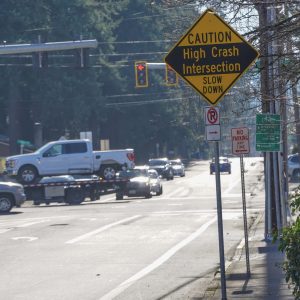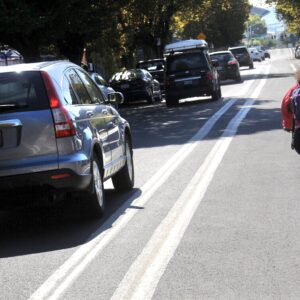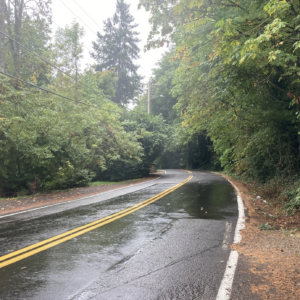
the 2006 Bridge Pedal.
(Photo © J. Maus)
Welcome to the first in a six-part series; Bike-share in Portland: A status report. The author of this guest article series is Tom Miller. Miller is the current Chief of Staff for Portland City Commissioner Sam Adams and he’ll follow Adams into the Mayor’s office in January.
Besides being Adams’ right-hand man, Miller is a major bike believer. This series arose from my constant prodding to Miller about the future of Portland’s bike-share program (an effort that began in February of 2007 but was shelved before a contractor was found).
In six parts, Miller will share his insider perspective on the inspiration, current status, and future potential for bike share in Portland.
Part One: Bike share in Portland; a brief history

(Photo © identity chris is/Flickr)
About two and a half years ago Commissioner (and now Mayor-Elect) Sam Adams attended a sustainable development conference at the request of Mayor Tom Potter in Lyon, France. For Sam the greatest inspiration came not from the conference but the host city. The City of Lyon in partnership with global advertiser JC Decaux had developed a bustling trade of community bicycles for low cost, short-term hire.
“It was amazing. Where residents previously were confined to transit schedules or the considerable expense of a private car, I saw folks blissfully whizzing about on shared bicycles. It was as if Portland’s [first generation honor code] yellow bike program had met its aspirations.”
“Bike share’s allure is intoxicatingly attractive to municipal leaders eager to join the sustainability party.”
Indeed, bike share’s allure is intoxicatingly attractive to municipal leaders eager to join the sustainability party. In almost every model, the host city pays nothing out of pocket. All costs are absorbed by a private provider who funds the program with proceeds earned from lucrative sales of advertising rights in the eyeball-heavy public right of way.
In exchange, programs done right—like those in Lyon or Paris—can deliver a holy grail of good public policy: instantaneous widespread behavior change to a travel choice that is cheaper, more humane, more user-friendly, and more sustainable than any other urban travel mode. Amsterdam, the world is on to your secret.
Sam returned home with intent to establish a bike share program as soon as reasonably possible. The premise was straight-forward: Portland is the nation’s most bike-friendly culture and would eagerly embrace a bike share program. We distributed a Request for Proposals and got down to two finalists.
“Naturally, a bike share program funded with public dollars will get much more scrutiny than one funded by a private entity.”
We assumed the strongest proposal would compellingly answer the logistical questions of how many bikes, where they go, how much we charge, how it’s paid for, etc. These questions are particularly important for Portland because, unlike other cities, Portlanders consistently express distaste for private advertising in the public right-of-way. Without being able to use to the traditional funding model for our bike share program, we presume a need to use public dollars. Naturally, a bike share program funded with public dollars will get much more scrutiny than one funded by a private entity.
In light of this dynamic, we asked ourselves whether success seemed inevitable. Regrettably, it did not. We held off.
This is a six-part series, the rest of the parts are below…







Thanks for reading.
BikePortland has served this community with independent community journalism since 2005. We rely on subscriptions from readers like you to survive. Your financial support is vital in keeping this valuable resource alive and well.
Please subscribe today to strengthen and expand our work.
These programs work because of advertising. There will need to be a little change in attitude if people really want this kind of program in their city. It costs a lot to operate a bike share program, an if not paid for by advertising it is unlikely anyone could afford to use it. In this way, it is much like public transit. I don’t like ads much either, but I’m happy that the busses, trains, etc are subsidised in this way, so that they can be affordable to as many users as possible
What, you don’t think the city can get a free bicycle system, completely paid for by a third party corporation, with no benefit to that corporation?
Geez, I think the city IS out of touch. I mean, even Trimet wraps its buses and the MAX with ads. Its nice not to have billboards, but the ads they stick on bikes are hardly that obtrusive.
Good to hear that bike share in Portland is still on the table.
I believe that the “distaste for private advertising in the public right-of-way” is something that would largely depend on how the advertising is done. I just got back from a visit to Sao Paulo (Brazil) where the Metro authority was in the midst of rolling out a medium-sized bike share program coined UseBike (the first bike loan program in Latin America), which relies heavily on the support of a private sponsor (Brazilian insurance company Porto Seguros). The logo advertising on the bikes was subtle and didn’t come across as a major eyesore.
Here is a link to the program’s web site:
http://tinyurl.com/5ep9j3
And here is a picture of the bikes:
http://tinyurl.com/62y7bg